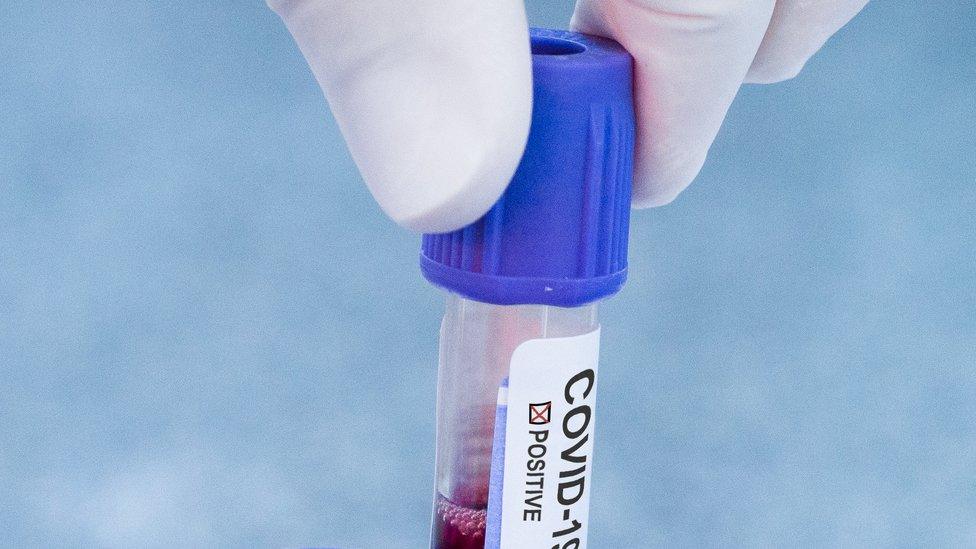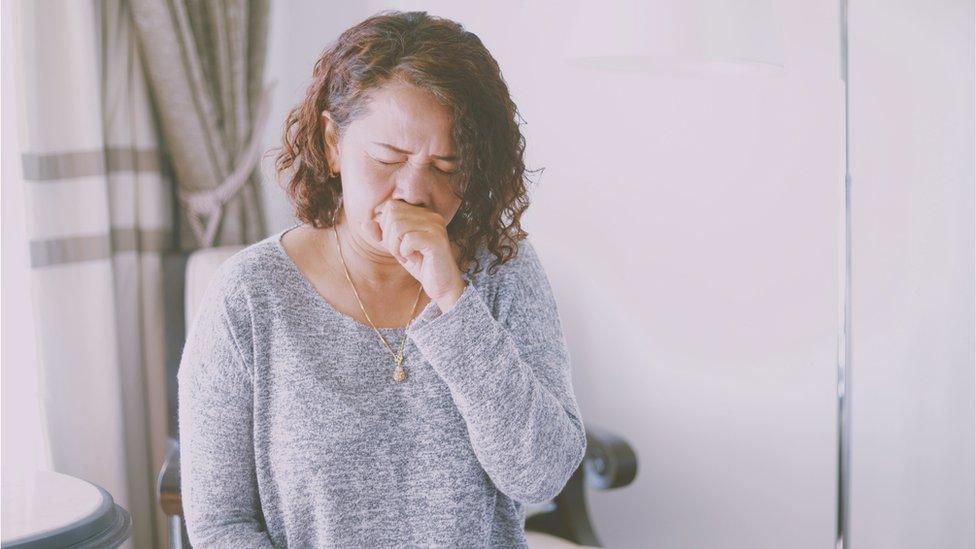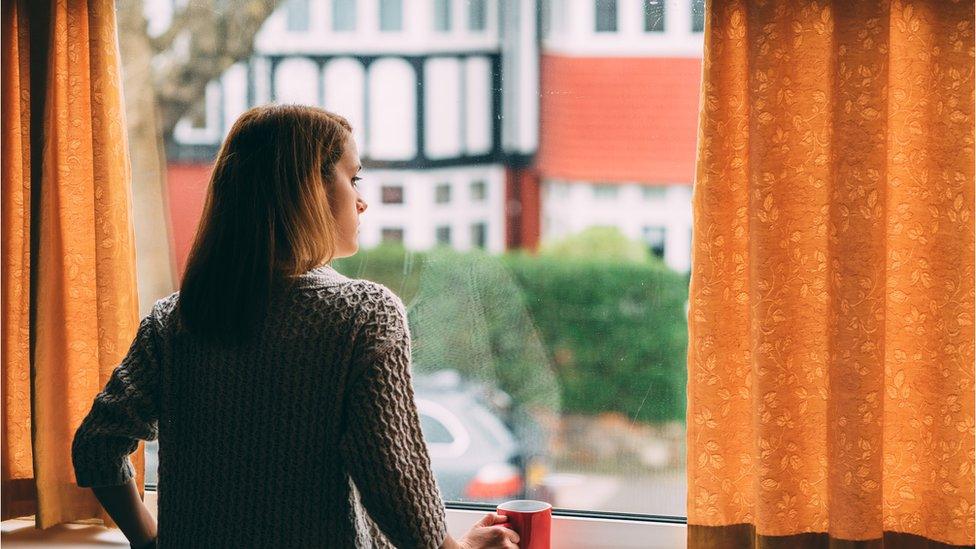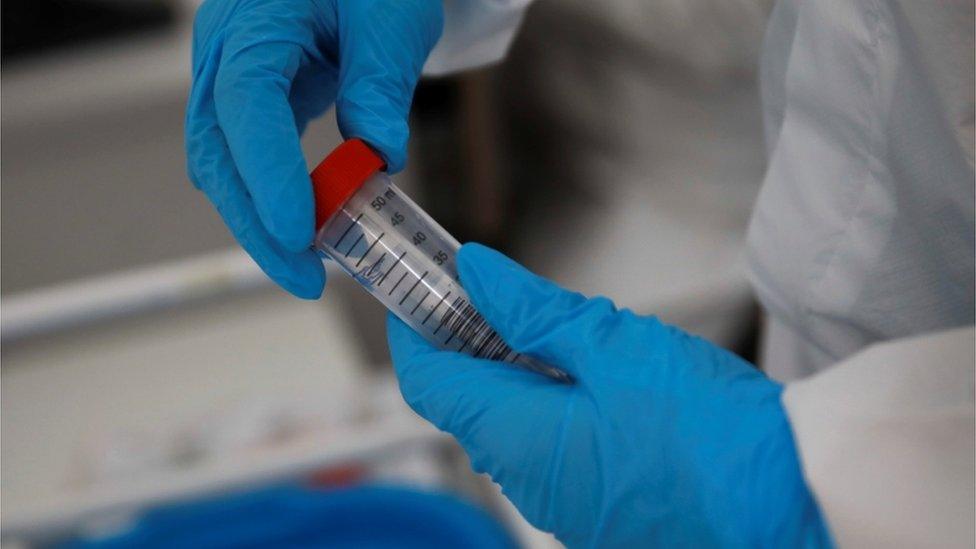Coronavirus NI Q&A: When should I get a Covid-19 test?
- Published

With Covid-19 cases continuing to surge in Northern Ireland, the importance of the local testing regime has never been more stark.
On Friday, a further 934 cases of Covid-19 in Northern Ireland were confirmed by the Department of Health, more than double the previous daily high.
However, there is still some confusion over who qualifies to be tested and when, as well as when people should self-isolate and for how long.
Since July, people living in Northern Ireland have been able to download the StopCOVID NI app to help track the virus., external
It has been operating alongside a contact tracing system run by the Public Health Agency.
BBC News NI has put together a Q&A looking at how the test-and-trace system works, with the aim of answering some of the most common questions.
When should I get a test?
Only people with symptoms of coronavirus should be tested.
The advice from the Public Health Agency (PHA) is that you should get tested in the first three days of coronavirus symptoms appearing, although testing is considered effective up until day five.

What are the symptoms?
A high temperature - this means you feel hot to touch on your chest or back (you do not need to measure your temperature), or;
A new, continuous cough - this means coughing a lot for more than an hour, or three or more coughing episodes in 24 hours (if you usually have a cough, it may be worse than usual), or;
Anosmia - the loss or a change in your normal sense of smell (it can also affect your sense of taste)
If I have symptoms what should I do?
Stay at home, self-isolate and arrange to be tested.
If you have symptoms of coronavirus infection, however mild, do not leave your home for at least 10 days from when your symptoms started and book a test.
How can I book a test?
You can book a test by visiting the PHA website, external (at pha.site/cvtesting).
What about people I live with?
If you live with others and you have symptoms of coronavirus, then all other household members must stay at home and not leave the house for 14 days.
The 14-day period starts from the day when the first person in the house developed symptoms.

If someone begins to show symptoms during this 14-day period, they'll need to stay home for up to 10 days from the day their symptoms started, even if this, for example, is on day 12 of their original 14-day self-isolation period. They should also arrange to be tested.
If I've been showing symptoms, when can I stop self-isolating?
You can stop self-isolating after 10 days from when your symptoms started depending on your existing symptoms:
If you have not had a high temperature for at least 48 hours, you no longer need to self-isolate
If you still have a high temperature, you need to self-isolate until your temperature has returned to normal for at least 48 hours
If you still only have a cough or loss of sense of smell/taste after 10 days, you no longer need to self-isolate as these symptoms can last for several weeks after the infection has gone
Can I stop isolating if I get a negative test result?
This depends on a few things.
You can stop self-isolation if:
You feel well enough, and have not had a high temperature for at least 48 hours
You still have a cough
You have not been identified as a close contact of a confirmed case
However, you will need to continue to self-isolate if:
You still have a high temperature - you can stop self-isolating once you have not had a high temperature for at least 48 hours
You are a close contact of a confirmed case - you must self-isolate for 14 days from your last contact with them
Anyone in your household has symptoms of Covid-19 and has not been tested (or is awaiting their results or not received a negative test result)
Anyone in your household tests positive for Covid-19

What if I'm told I'm a close contact?
There are two ways you could be alerted as being a close contact with someone who has tested positive - either via a text message by the PHA or via the STOPCOVID NI app.
If the PHA texts you, the alert will come as a message from 'HSC Tracing'.
You may also be alerted by the app - this is because it has detected that you have been in close proximity to a positive case for a sufficient duration to put you at risk of infection.
The app functions in an anonymous way, so you may not be also contacted by PHA because the person you have been close to may not be known to you.
As a close contact, you will be asked to self-isolate for up to 14 days. It's really important to do this even if you don't feel unwell, because it can take up to 14 days for the symptoms of infection to develop.
This will be crucial to avoid you unknowingly spreading the virus to others.
BBC Reality Check looks at why testing matters
If you have no symptoms, your household doesn't need to self-isolate with you, but they must take extra care to follow the guidance on social distancing, hand hygiene and respiratory hygiene.
If you develop symptoms, you must self-isolate for up to 10 days and you should arrange to be tested.
- Published28 June 2021

- Published1 October 2020
